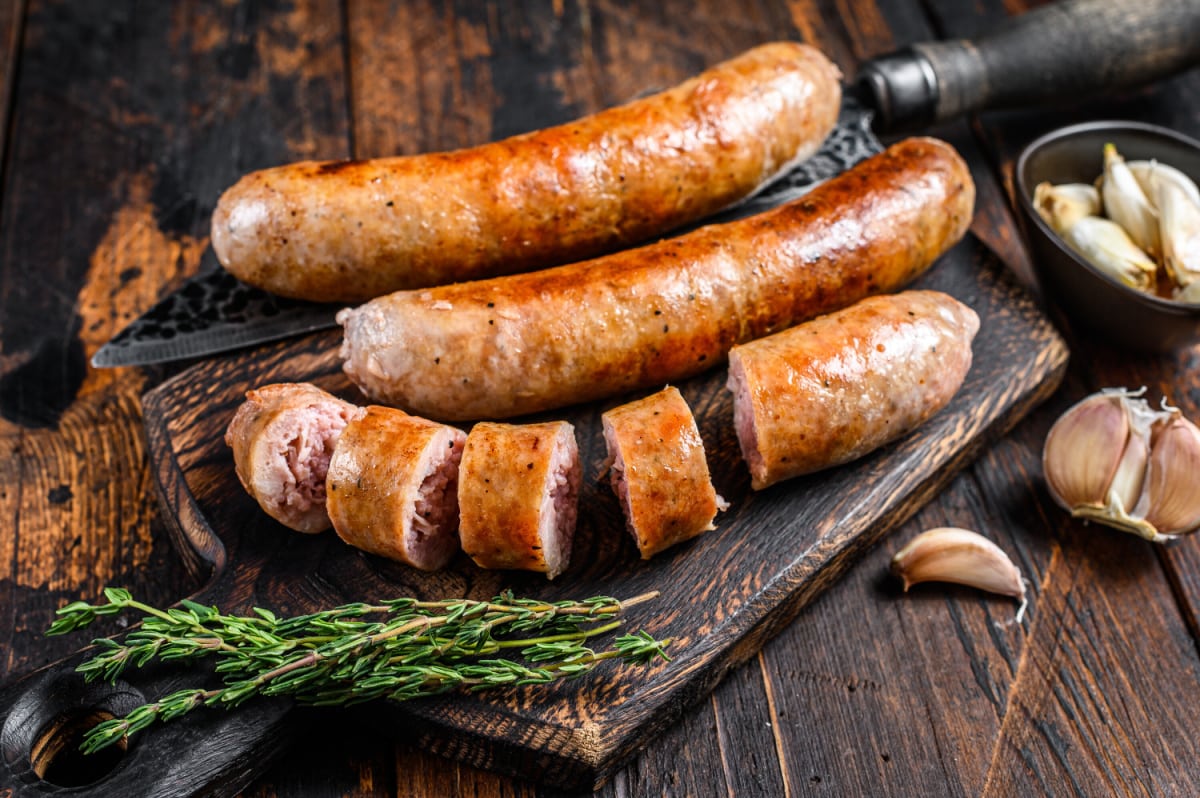7 Bad Foods for Liver Health
If you want to keep your whole body running properly, you will want to avoid some of the bad foods for liver health that may be in your pantry.
Also check out Signs You May Have a Bad Liver, Best Herbs for Liver Health, and Home Remedies for Fatty Liver!
The liver is one of the most important organs in your body. This is because it performs essential functions like detoxifying the body of harmful substances, producing bile for digestion, and storing essential nutrients.
However, various factors may affect your liver’s ability to perform these functions. A common culprit that’s often overlooked is food.
That’s why in our article today, we’ll be looking at bad foods for the liver so you can avoid them and, thus, promote healthy liver and functions.
What Is The Liver?
The liver is one of the largest organs in the human body and is crucial in maintaining overall health. The liver is sometimes considered a gland because it secretes various chemicals that the body needs.
It is located on the right side of the abdomen, just below the diaphragm, and is protected by the rib cage.
The liver receives blood from two sources: oxygen-rich blood from the hepatic artery and nutrient-rich blood from the intestines through the portal vein. The liver then processes this blood before sending it back into circulation to nourish other organs throughout the body.
Due to its critical functions, diseases or damage to the liver can have serious consequences on overall health. Common conditions that affect the liver include hepatitis, cirrhosis (scarring), fatty liver disease, and cancer.
Maintaining a healthy lifestyle with proper nutrition and regular exercise can help protect your liver from damage. If you experience any symptoms, such as abdominal pain or swelling, fatigue, or jaundice (yellowing of skin/eyes), it’s important to seek medical attention promptly.
What Does The Liver Do?
The liver has many important functions, such as:
1. Detoxification
The liver’s primary function is to filter and process toxins, chemicals, and other harmful substances that enter our bodies through food, water, or air.
The liver works hard to remove these toxins from our bloodstream before they can cause any damage to our cells or organs.
One way the liver promotes detoxification is by producing enzymes that break down toxic substances into less harmful ones. These enzymes also help metabolize drugs, alcohol, and other foreign compounds.
Another way the liver supports detoxification is by converting fat-soluble toxins into water-soluble molecules that can easily be excreted through urine or feces.
In addition, the liver produces bile which carries waste products out of the body. Bile contains cholesterol, bilirubin (a breakdown product of red blood cells), and various salts. These components bind with toxins making them easier for your intestines to expel during bowel movements.
2. Boosts immunity
The liver contains various cells that work together to fight off harmful pathogens and toxins that can affect our health. These cells include macrophages, natural killer cells, dendritic cells, and T-cells.
Macrophages are specialized white blood cells that engulf and digest invading microorganisms. They act as the first line of defense against infections and stimulate other immune responses by releasing cytokines.
Natural killer cells are another type of white blood cell present in the liver. They recognize infected or abnormal cells and destroy them before they become cancerous or spread throughout the body.
Hepatic dendritic cells are responsible for presenting antigens – foreign substances such as viruses or bacteria- to T-cells so they can recognize them as threats and launch an attack.
T-cells play a critical role in destroying infected or abnormal cells by producing chemicals called cytokines that help activate other immune system components.
3. Storage of nutrients
The liver stores nutrients like iron, copper, and vitamins A, D, E, and K. These nutrients play a vital role in various bodily functions such as blood clotting, immune system support, bone health maintenance, and vision protection.
Vitamin A helps maintain healthy eyesight, while vitamin D helps bones absorb calcium better. In addition to these essential vitamins and minerals, the liver also stores glucose in the form of glycogen.
This stored glucose is released into the bloodstream when there’s a need for energy or when blood sugar levels drop too low.
4. Protein synthesis
Proteins are large complex molecules that are essential for numerous vital processes in our body, including the growth, repair, and maintenance of tissues, transportation of oxygen and nutrients throughout the body, and regulation of various biochemical reactions.
The liver synthesizes different types of proteins that perform specific functions in our body.
Bad Foods for Liver Health:
There are a number of foods that can be detrimental to liver health. These include:
1. Fried foods
Fried foods contain high levels of trans fats, which are known to be harmful to your overall health, especially when consumed in excess amounts.
Trans fats increase bad cholesterol levels (LDL) and decrease good cholesterol levels (HDL), thereby increasing the risk of heart disease.
Moreover, excessive consumption of fried foods can cause non-alcoholic fatty liver disease (NAFLD). NAFLD is a condition where there is an accumulation of fat in the liver due to poor diet choices and lifestyle habits.
When you eat fried food regularly, the fats in them also trigger liver inflammation, which may facilitate cirrhosis.
Besides, trans fats can increase the production of free radicals, which may damage cells and tissues in your body, including your liver cells.
2. Added sugar
One of the liver’s primary functions is to process and metabolize the nutrients we consume, including sugar.
However, when we consume an excessive amount of added sugar, it can have harmful effects on our liver. Added sugar refers to any form of sugar that has been added to food products during processing or preparation.
Some mechanisms through which added sugar can damage the liver include:
a. Increases fat deposits
Like fatty foods, consuming too much added sugar can increase fat deposition in the liver, which may result in non-alcoholic fatty liver disease. This is especially true if you consume too much fructose.
Fructose is the form of sugar found in fruits and other sources like high fructose corn syrup. It’s metabolized differently from table sugar in that when you consume it, it goes directly to the liver, where it’s metabolized.
b. Causes inflammation
High intake of added sugars also causes inflammation in the liver, leading to damage and scarring over time. This inflammation impedes proper functioning and may lead to more serious conditions like cirrhosis and even cancer.
So to protect your liver’s health, limiting your intake of added sugars is essential. Avoid sugary drinks like soda and sweetened juices; instead, opt for water or unsweetened tea or coffee.
Also, limit processed foods like packaged snacks and candies, which often contain hidden sources of added sugars.
4. Alcohol
When you consume alcohol, it gets absorbed into your bloodstream and travels straight to your liver.
The liver has enzymes that break down alcohol into acetaldehyde (a toxic substance and a known carcinogen), which is then broken down into a less active byproduct, acetate. Acetate is further broken down into carbon dioxide and water.
However, when we drink too much alcohol or over an extended period repeatedly, the amount of acetaldehyde produced overwhelms the liver’s ability to break it down effectively.
This toxic substance can cause inflammation in the liver cells leading to alcoholic hepatitis.
Over time this continuous cycle of destruction leads to fibrosis (scarring) of the liver tissue, known as cirrhosis – irreversible damage that affects its functioning.
As cirrhosis progresses, scar tissue replaces healthy liver tissue reducing blood flow through the organ and making it difficult for it to do its job properly.
Once cirrhosis develops fully within your liver, you may experience symptoms like jaundice (yellowing of skin or eyes), abdominal swelling due to fluid retention (ascites), and gastrointestinal bleeding due to ruptured veins due to esophageal varices. This occurs because blood can’t flow freely into the damaged liver, so it backs up in the veins in your esophagus, causing them to ballon outwards and rupture.
5. Red meat and processed meat
In one study, participants with a high intake of red meat had a three-fold higher risk of developing NAFLD than those with a low intake. At the same time, those with a high intake of processed meat had a 3.28 increased risk of developing NAFLD.
A few reasons why red meat damages the liver include the following:
High levels of saturated fat
Red meat is high in saturated fat, which has been linked to an increased risk of liver disease. Saturated fat can lead to inflammation in the liver and impair its ability to function properly.
Harmful chemicals
Processed red meats such as sausages and bacon contain harmful chemicals such as nitrites and nitrates. These chemicals are added during processing for preservation purposes but are known carcinogens that can damage the liver over time.
Iron overload
Red meat is also high in iron, which can be beneficial when consumed in moderation. However, excessive consumption of iron-rich foods like red meat can lead to iron overload or hemochromatosis. This condition causes excess iron accumulation in various organs, including the liver leading to severe liver damage.
Excess protein
When we consume red meat, our body breaks down the protein into amino acids for energy and muscle repair. However, excessive intake of protein beyond what our body needs can lead to an overload on the liver. The liver has to work harder to break down excess proteins, which results in increased stress on this vital organ.
6. White flour
White flour is a refined carbohydrate that is commonly found in many processed foods such as bread, pasta, and baked goods.
While it may be convenient and tasty, consuming white flour regularly can be harmful to your liver.
One of the primary ways white flour can damage the liver is by causing inflammation.
When we eat foods that are high in refined carbohydrates like white flour, our bodies produce insulin to help regulate blood sugar levels.
However, over time, this constant increase in blood sugar can lead to insulin resistance and chronic inflammation throughout the body.
As mentioned earlier, inflammation in the liver can cause scarring and damage to liver cells, eventually leading to cirrhosis or even liver failure.
In addition to these risks, consuming large amounts of white flour can also contribute to weight gain and obesity – both of which are major risk factors for developing non-alcoholic fatty liver disease.
7. Soft drinks
Soft drinks are a popular beverage choice for many individuals. They come in various flavors, and their easy accessibility has made them a favorite among most people. However, the excessive consumption of soft drinks can be detrimental to one’s health, including the liver.
Soft drinks contain high levels of sugar and artificial sweeteners that can lead to obesity, heart disease, and other severe health issues.
For instance, a study found that consuming five soft drinks or more per week increased the risk of type 2 diabetes compared to those that took less than one drink.
Another study published in the journal Clinical Gastroenterology and Hepatology found that consuming one or more sugar-sweetened drinks per day for 5-7 years led to fatty liver disease.
The sugar content in soft drinks is also responsible for causing an increase in insulin production by the pancreas, which puts stress on the liver to metabolize it.
When consumed excessively over a prolonged period, soft drinks can contribute to non-alcoholic fatty liver disease.
Liver Foods to Consume
Now that you understand bad foods for liver to avoid, some foods may help boost your liver health. These may include:
- Grapefruit
- Grapes
- Cruciferous vegetables like broccoli, cabbage, brussels sprouts, kale, and cauliflower
- Nuts
- Olive oil
- Beetroot
Besides food, staying hydrated and engaging in regular exercise can also boost your liver health as well as general well-being.
Final Thoughts
The liver is an essential organ in the body, and it is crucial to be mindful of what you consume, as certain foods can harm it.
Foods high in saturated fats, sugar, refined flour, and alcohol are known to cause inflammation and damage to the liver over time.
Incorporating healthy foods such as fruits, vegetables, and whole grains into your diet can help support liver health.
Regular exercise and staying hydrated also play a significant role in maintaining good liver function.
Ultimately, being conscious of your food choices and making informed decisions about what you eat can go a long way in promoting overall health and well-being
More Related Topics:
- Best Herbs for Energy
- Best Herbs for Weight Loss
- Acne Scar Home Remedies
- UTI Remedies
- Best Herbs for Skin
- How To Balance Cortisol Levels Naturally
- How To Reverse Adrenal Fatigue
If you enjoyed this post about the Bad Foods for Liver Health and would love to see more, join me on Youtube, Instagram, Facebook & Twitter!
Get discounted copies of my cookbook here.
Fortunately, because of the ads on our website, readers and subscribers of Healthier Steps are sponsoring many underprivileged families.













